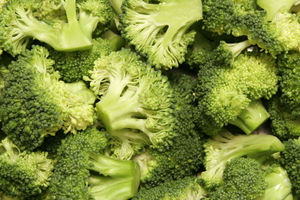Broccoli and Skin Cancer

This one is going to launch a thousand gags on the late night talk shows, but it is actually quite serious.
Despite what you hear on some of those infomercials, there is a strong link between ultraviolet radiation (UVR) and many kinds of skin cancer. You can even use ultraviolet radiation to induce cancerous change in cells cultures in a Petri dish.
In an article from Johns Hopkins University published in the Proceedings of the National Academy of Sciences damaging effects of UVR can be significantly reduced by the topical application of a broccoli extract called sulforaphane that comes from broccoli sprouts. Sulforaphane was first identified over 15 years ago, and it has been shown to play a role in preventing the development of several types of tumors that can be induced by cancer-causing chemicals. It may also have a role
in fighting some established tumors.

The research involved both animal and human studies, and showed that the level of erythema (skin reddening) caused by UVR is substantially reduced when this extract is applied to the skin.
The broccoli extract is not acting like a sunscreen; it does not absorb the UVR, neither does it stop it from entering the skin. Instead it enters the cells and switches on the production of several enzymes that protect cells from UV damage. The result is that the protective effect is sustained for days after the extract has been removed.
The advantage of this is that it is much longer-lasting than any sunscreen – several days, in fact. The scientists said the protection is still there when no extract is present on/in the skin.
The researchers first tested sulforaphane on mouse models of skin cancer, and then on six healthy human volunteers.
Each of the volunteers had small patch of skin exposed to a pulse of UVR. Some of the patches were treated with the broccoli extract while others were not.
At the highest UVR dosages, UVR-induced redness and inflammation was on average 37% lower when the extract had been applied, and the protection was sustained for at least three days. They also found that protection varied greatly depending on the person – protection ranged from 8% to 78%.
These variation may be due to the volunteers’ different skin types, dietary habits and genetic differences.
In these trials, the conventional sunscreens did not provide significant protection.
This research is important for several reasons:
- The research re-emphasizes the importance of recognizing inter-individual differences. An approach that works for one person may not help another
- There are many times in life when we cannot do much to prevent something bad happening to us: radiation, stress or somebody being mean. The new approach s not just to prevent exposure, but also to work on resilience: how can we stop ourselves from having a bad reaction? The whole of us, from our cells to our soul?
- It is inevitable that people will start telling you that broccoli is the way to protect yourself against skin cancer, and I am just waiting for the advertisements to start coming in. Do not be fooled! This research involves a specific extract applied to a precise area of skin. As far as we know, it does not apply to eating broccoli






